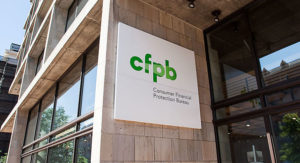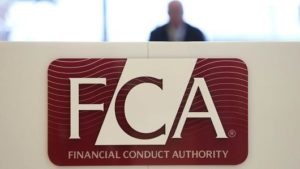
Eight years after the financial crisis, corporations are still under intense scrutiny. Questions remain about the role financial corporations played in the crisis, and whether they were really held accountable for their actions. You expect some of this during an election year: beating up corporations is a time-honored way to prove your populist bona fides and win votes. But these attacks continue to be effective because of a perception among Americans on both sides of the political spectrum that corporations—especially banks and financial services—lack sufficient oversight and regulation.
The US and UK each created new agencies to address these concerns. In the US, the Consumer Financial Protection Bureau was created in 2011 to protect consumers from bad actors in financial markets—banks, lending agencies, mortgage brokers and others.


The CFPB has successfully brought charges and fines against a wide array of organizations for deceptive financial practices, returning more than $10.1 billion to over 17 million victims. In 2013, the UK created a new regulatory agency called The Financial Conduct Authority. The FCA is responsible for protecting UK financial markets by tightly regulating the way financial products are marketed and sold. Unlike its US counterpart, the FCA’s powers are daunting—it can order firms to change or even cancel promotions it considers misleading.
With this renewed focus on protecting consumers from financial firms, what does this mean for the future of client entertainment? Will it be seen merely as an expensive boondoggle—fat cats wining and dining their customers? More than ever, companies need to show how providing amazing experiences for their customers is a legitimate way to deepen relationships and drive business results. If they don’t, we could easily follow the UK’s example.
FCA regulators have recently begun cracking down on client entertainment. Fund managers are under fire by the FCA for entertaining clients with events that were “…not conducive to business discussions.” It goes on to say that “Hospitality provided or received did not always appear to be designed to enhance the quality of service to the client.”
Claiming “boondoggle” and pointing fingers at corporations is an easy way to pander to the voting masses and can always be expected from an organization like the FCA as it’s an easy way to get press. Careful examination of the events at hand is necessary to come to any conclusion.
Our study of over 15 million sports tickets and customer entertainment invitations proves taking a client to an event based on a careful study of that client’s interests can yield huge benefits to any company in a world where most marketing has become white noise. When done right, client entertainment can differentiate in the eyes of prospects and customers, especially in mature and commoditized industries like finance.
In this case the FCA seems arrogant and lacking in data when they laments: “These benefits did not appear capable of enhancing the quality of service to clients as they were either not conducive to business discussions or the discussions could better take place without these activities.” (Emphasis mine). What is the FCA’s response when confronted with facts like it takes 18 approvals, from mostly well-seasoned executives with graduate degrees, to approve new customer entertainment spend at Coca-Cola or American Express? Do they have better data on how to sell financial instruments and beverages than the two largest most well-funded companies in the game?
Yes—a conversation can take place on a golf course or in a meeting room. Anyone who has spent any time in sales or marketing of any kind, however, knows customers aren’t lining up to have another meeting in a “meeting room.” There’s a reason we like to step out for certain discussions, and it’s not about scoring a nice boondoggle. Having a conversation about a major business decision or investment move outside a typical business setting helps build relationships in industries driven by them and, more importantly, helps get the ear of a customer otherwise inaccessible to the company due to time constraints. The power of experience is very real. If the FCA believes what they say, that the conversation on a golf course or at a sporting event cannot “enhance the quality of service to a client,” then how do blast emails, billboards, tv/radio advertisements, and digital marketing “enhance the quality of service to a client?”
Researchers have found that better learning takes place when students look at content in a variety of different settings, rather than in the same, familiar environment:
The brain makes subtle associations between what it is studying and the background sensations it has at the time, the authors say, regardless of whether those perceptions are conscious.[1]
If that’s true for kids in school, then why not for adults? Creating special experiences for your clients takes them out of their familiar trappings. It gives them unique perspectives on how they see things—and could result in them making a better decision.
Many businesses today use analytics to carefully measure their performance. From marketing to financial to operations, nearly every measurement of a company’s health can be quantified. Why not client entertainment? Measuring the return on your entertainment assets can show regulators that what they thought was unnecessary actually turned out to be a vital part of your business.
Besides, would you want the government telling you how to shoot your next commercial, choose your brand colors, or design your logo? I don’t think so. Then why should the government tell you how you should take care of your clients?
While the US Consumer Financial Protection Bureau currently lacks the sweeping powers of the UK’s Financial Conduct Authority, many Americans strongly support increasing regulation of Wall Street and the financial sector. It is more important than ever for companies to show why client entertainment matters. Without measurable results, providing amazing experiences for your customers could be mischaracterized as an expensive boondoggle without any real business purpose.
The FCA was born in the wake of the 2008 financial crisis and with good cause. Just like with anything else of value, there will be those who abuse the system. It’s easy to see why governments want to be seen reining in the financial sector. It’s cheap press. Us vs Them. But if the FCA really thinks it is serving an important role by dictating what kind of client entertainment companies can and can’t do, it’s going to need to come with a much stronger game than this. If not, stick to bloated bureaucracy.
[1] http://www.nytimes.com/2010/09/07/health/views/07mind.html